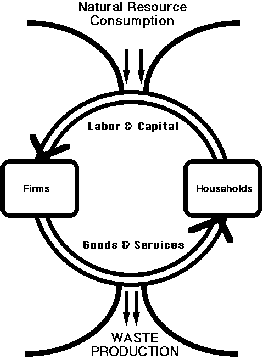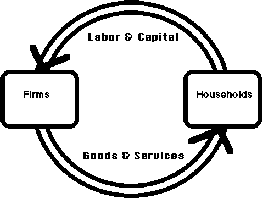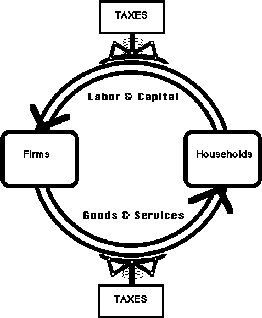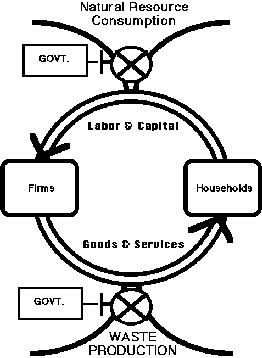

This is how economists view the world.
It's a cyclical machine with two main parts: households and firms. Households provide labor and capital for firms, and firms provide goods and services for households. But there's something wrong here. This machine uses no fuel, and it produces no exhaust. It's a perpetual motion machine.

This is how the economy really is. It uses natural resources as fuel, and it puts waste back into the environment. Economists ignore this, and blindly demand that the cycle spin faster and faster, causing more and more depletion and pollution.
It gets worse. There's a third entity here: government. How does it fit in? Economists incorporated it into their system by having it extract from the flow of the loop - by taxing labor and capital and goods and services: income tax, corporate profit tax, capital gains tax, and sales tax. Taxes act like a brake, making it harder to get around the loop.
Economists call this braking effect "excess burden." In addition to their direct cost, these taxes impose further costs by making some economic activity uneconomical. This means reduced incentive to work, reduced incentive to invest, unemployment, and other things. Dale Jorgenson at Harvard estimates this cost at an extra 50 cents to a dollar for every dollar we pay in taxes. That makes taxes cost us nearly twice as much!

But think of what this does to the environment. If labor and capital are more expensive, we'll substitute natural resources - which aren't taxed - for the other factors of production. There was an ad in Newsweek once where a company boasted that it had cut the labor and capital costs of storing documents by putting all their documents on CD-ROM. Now it prints out documents only as it needs them - and now goes through a million sheets of paper a day!
Now think about this for a second. There's a solution which solves everything, in principle. The idea is promoted by the World Resources Institute, the Global Futures Foundation, and other economists whose minds aren't still stuck on the assumptions made in the twenties and thirties.
Rather than braking the generation of stuff that we want, and letting the resource flow that we don't want to happen freely, we can do the opposite. So remove the brakes on labor and capital and replace them with valves on consumption and waste.
There are a number of ways to do this. We could tax things like gas and garbage and timber and copper, or we could auction off the rights to extract resources or to produce waste. My favorite idea is based on the ideas of Herman Daly at the University of Maryland and Ernst von Weizsacker, who worked at the UN. The idea is to come up with a conservative estimate of the amount of stuff we can extract or throw away sustainably - that is, the rate that nature can continually bear our impact without compromising its future ability. Sell permits to consume or produce waste - but cap the number of permits at that sustainability rate. Charge enough for the permits to cover the cost of government. This is how we set income, profit, and capital gains taxes now.

Let's compare labor and capital taxes with consumption and waste permits.
I showed that our tax system is an economic burden. A permit system would actually be an economic benefit, since it more closely reflects the true cost of our resources. The world resources institute predicts that just charging 50 cents to a dollar per garbage bag would generate four and a half billion dollars for government, plus a half-billion-dollar economic benefit.
Income taxes are inherently wrong, because they take from you what you have produced for yourself. NOT charging for resources is inherently wrong, because we're giving away resources which we collectively own. The right thing to do - the fair thing to do - is to let people keep what's theirs but make people pay to make what belongs to the public their own. This way, we can pay for our government, sustain our environment, and be free from unjust taxes. It just makes more sense.